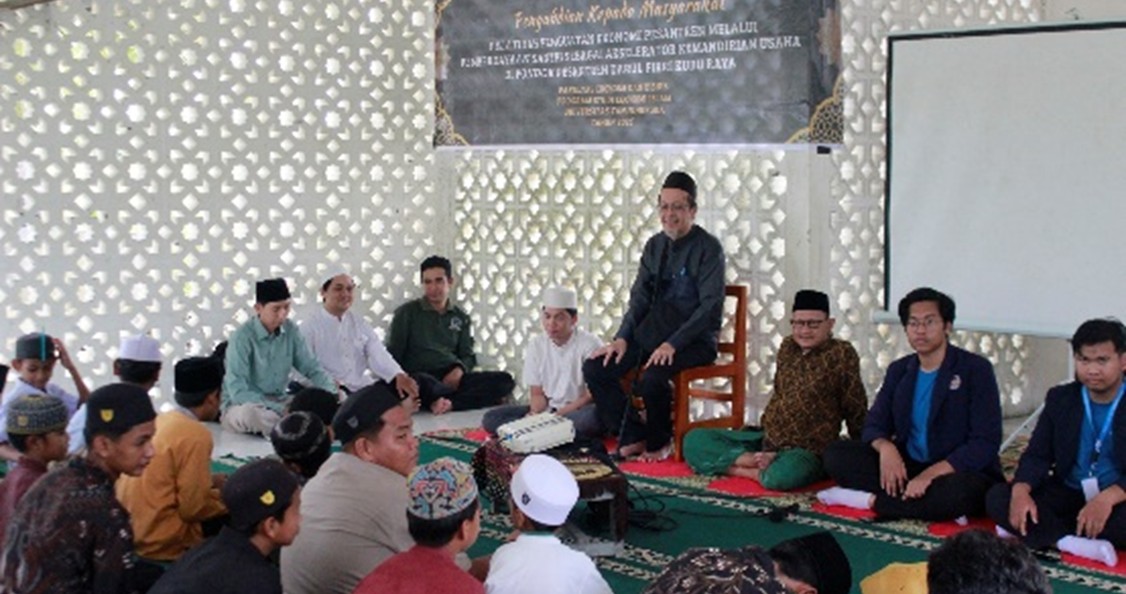Pelatihan penguatan ekonomi pesantren melalui pemberdayaan usaha santri di Pondok Pesantren Darul Fikri Kabupaten Kubu Raya
DOI:
https://doi.org/10.53088/penamas.v5i4.2269Keywords:
Entrepreneurship, Business Independence, Islamic Boarding School, Student EmpowermentAbstract
Islamic boarding schools play a strategic role in producing a generation that is not only outstanding in religious aspects but also economically independent. However, many Islamic boarding schools still face limitations in optimally managing their economic potential. Therefore, this activity aims to enhance students' capabilities in entrepreneurship and business management. This initiative is designed as a training programme focused on creative and digital economy-based entrepreneurship, business management, and the optimisation of pesantren resources. The methods employed include theoretical training, hands-on practice, and ongoing mentoring to enable students to develop and manage businesses independently. This training creates a sustainable business ecosystem within the boarding school, enhances students' entrepreneurial skills, and increases the number of productive business units that can serve as income sources for the boarding school. Through this training, positive impacts are generated, including the enhancement of students' entrepreneurial knowledge and the management of Darul Fikri Islamic Boarding School, enabling the school to become a model of an economically independent boarding school and to contribute positively to the surrounding community.
References
Ajzen, I. (1991). The Theory of Planned Behavior. Organizational Behavior and Human Decision Processes, 50, 179–211.
Baidhowi, & Setiawan, A. (2019). Harmonization of Islamic Law Norms in Sharia Banking Laws. https://doi.org/10.2991/icils-19.2019.39
Bošnjak, M., Ajzen, I., & Schmidt, P. (2020). The theory of planned behavior: Selected recent advances and applications. Europe’s Journal of Psychology, 16(ue 3), 352. https://doi.org/10.5964/ejop.v16i3.3107
Farid, M., & Rahman, F. (2021). Pelatihan Kewirausahaan Model Santripreneur di Pondok Pesantren. Prosiding Seminar Nasional Pengabdian Kepada Masyarakat, 1(1), 106–117.
Garrido, G. L. (2025). Bandura’s Self-Efficacy Theory Of Motivation In Psychology. Simplypsychology.https://www.simplypsychology.org/self-efficacy.html
Greenbank, P., & Hepworth, S. (2008). Improving the career decisionmaking behaviour of working class students: Do economic barriers stand in the way? Journal of European Industrial Training, 32(7). https://doi.org/10.1108/03090590810899801
Grilli, G., & Notaro, S. (2018). Exploring the influence of an extended theory of planned behaviour on preferences and willingness to pay for participatory natural resources management. Journal of Environmental Management, 232, 902. https://doi.org/10.1016/j.jenvman.2018.11.103
Knabe, A. (2012). Applying Ajzen’s Theor s Theory of Planned Beha y of Planned Behavior to a Study of Online o a Study of Online Course Adoption in Public Relations Education. Social Psychology Commons, 186(January), 1–237.
Mustofa, M. A., Fahrozi, R., Silviani, D., & Andaka, F. (2022). Pelatihan Kewirausahaan untuk Santri di Pesantren Hidayatullah Depok. Jurnal Peradaban Masyarakat, 2(5), 14–20. https://doi.org/10.55182/jpm.v2i5.246
Özkan, Ö., Norman, P., Rowe, R., Day, M., & Poulter, D. (2024). Predicting drivers’ intentions to voluntarily use intelligent speed assistance systems: An application of the theory of planned behaviour. Transportation Research Part F Traffic Psychology and Behaviour, 104, 532. https://doi.org/10.1016/j.trf.2024.06.003
Sajid, M., Zakkariya, K. A., & Ertz, M. (2023). Beyond the bin: overcoming the intention–behavior gap in zero-waste living. Management of Environmental Quality An International Journal, 35(3), 587. https://doi.org/10.1108/meq-07-2023-0218
Santoso, G., Rizal, M., Wiyana, H., & Subagja, S. N. (2025). JUBISDIGI : Jurnal Bisnis Digital Digitalisasi UMKM : Strategi Dan Model Bisnis Berbasis Teknologi Untuk Keberlanjutan JUBISDIGI : Jurnal Bisnis Digital. 01(01), 21–30. https://doi.org/10.9030/jubisdigi.v1i1.936
Prihatiningtyas, S., Umardiyah, F., Wulandari, A., Wardani, D. K., Ningsih, W. S., Mufajar, I. A., & Wildan, M. A. (2024). Pemberdayaan Masyarakat Melalui Digital Marketing Dalam Meningkatkan Penjualan Produk UMKM Di Desa Pesantren. Jumat Ekonomi: Jurnal Pengabdian Masyarakat, 5(1), 42-50.https://doi.org/10.32764/abdimasekon.v5i1.4495

Downloads
Published
How to Cite
Issue
Section
License
Copyright (c) 2025 Supriaman, Memet Agustiar, Faishol Luthfi, M. Iman Taufik, Diah Arminingsih

This work is licensed under a Creative Commons Attribution-ShareAlike 4.0 International License.
Authors who publish with this journal agree to the following terms:
The author(s) retain copyright and grant the journal the right of first publication with the work simultaneously licensed under a CC BY-SA 4.0 license that allows others to remix, adapt, and build upon the work even for commercial purposes, as long as they credit the author(s) and license their new creations under the identical terms.
License details: https://creativecommons.org/licenses/by-sa/4.0/


